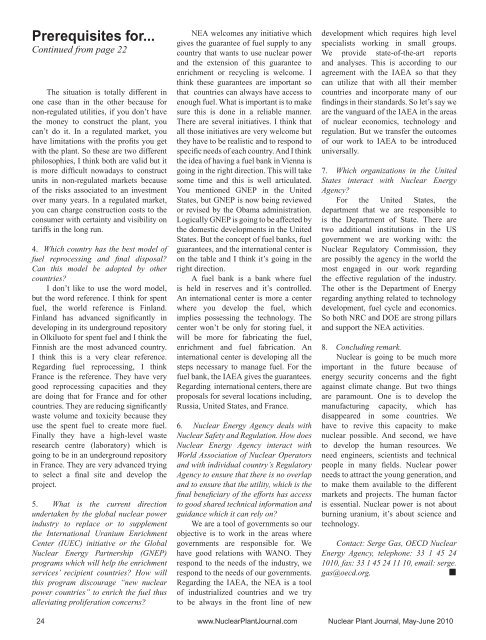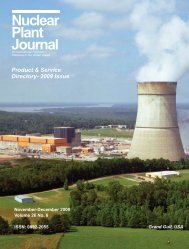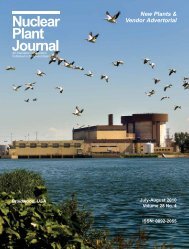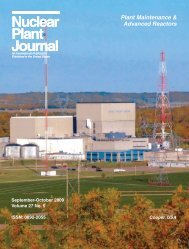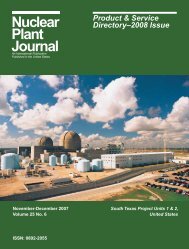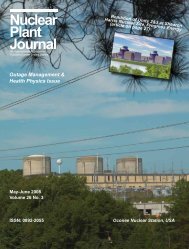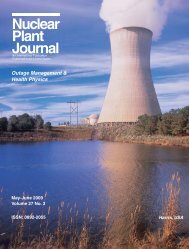New Energy - Digital Versions - Nuclear Plant Journal
New Energy - Digital Versions - Nuclear Plant Journal
New Energy - Digital Versions - Nuclear Plant Journal
Create successful ePaper yourself
Turn your PDF publications into a flip-book with our unique Google optimized e-Paper software.
Prerequisites for...<br />
Continued from page 22<br />
The situation is totally different in<br />
one case than in the other because for<br />
non-regulated utilities, if you don’t have<br />
the money to construct the plant, you<br />
can’t do it. In a regulated market, you<br />
have limitations with the profits you get<br />
with the plant. So these are two different<br />
philosophies, I think both are valid but it<br />
is more difficult nowadays to construct<br />
units in non-regulated markets because<br />
of the risks associated to an investment<br />
over many years. In a regulated market,<br />
you can charge construction costs to the<br />
consumer with certainty and visibility on<br />
tariffs in the long run.<br />
4. Which country has the best model of<br />
fuel reprocessing and fi nal disposal?<br />
Can this model be adopted by other<br />
countries?<br />
I don’t like to use the word model,<br />
but the word reference. I think for spent<br />
fuel, the world reference is Finland.<br />
Finland has advanced significantly in<br />
developing in its underground repository<br />
in Olkiluoto for spent fuel and I think the<br />
Finnish are the most advanced country.<br />
I think this is a very clear reference.<br />
Regarding fuel reprocessing, I think<br />
France is the reference. They have very<br />
good reprocessing capacities and they<br />
are doing that for France and for other<br />
countries. They are reducing significantly<br />
waste volume and toxicity because they<br />
use the spent fuel to create more fuel.<br />
Finally they have a high-level waste<br />
research centre (laboratory) which is<br />
going to be in an underground repository<br />
in France. They are very advanced trying<br />
to select a final site and develop the<br />
project.<br />
5. What is the current direction<br />
undertaken by the global nuclear power<br />
industry to replace or to supplement<br />
the International Uranium Enrichment<br />
Center (IUEC) initiative or the Global<br />
<strong>Nuclear</strong> <strong>Energy</strong> Partnership (GNEP)<br />
programs which will help the enrichment<br />
services’ recipient countries? How will<br />
this program discourage “new nuclear<br />
power countries” to enrich the fuel thus<br />
alleviating proliferation concerns?<br />
NEA welcomes any initiative which<br />
gives the guarantee of fuel supply to any<br />
country that wants to use nuclear power<br />
and the extension of this guarantee to<br />
enrichment or recycling is welcome. I<br />
think these guarantees are important so<br />
that countries can always have access to<br />
enough fuel. What is important is to make<br />
sure this is done in a reliable manner.<br />
There are several initiatives. I think that<br />
all those initiatives are very welcome but<br />
they have to be realistic and to respond to<br />
specific needs of each country. And I think<br />
the idea of having a fuel bank in Vienna is<br />
going in the right direction. This will take<br />
some time and this is well articulated.<br />
You mentioned GNEP in the United<br />
States, but GNEP is now being reviewed<br />
or revised by the Obama administration.<br />
Logically GNEP is going to be affected by<br />
the domestic developments in the United<br />
States. But the concept of fuel banks, fuel<br />
guarantees, and the international center is<br />
on the table and I think it’s going in the<br />
right direction.<br />
A fuel bank is a bank where fuel<br />
is held in reserves and it’s controlled.<br />
An international center is more a center<br />
where you develop the fuel, which<br />
implies possessing the technology. The<br />
center won’t be only for storing fuel, it<br />
will be more for fabricating the fuel,<br />
enrichment and fuel fabrication. An<br />
international center is developing all the<br />
steps necessary to manage fuel. For the<br />
fuel bank, the IAEA gives the guarantees.<br />
Regarding international centers, there are<br />
proposals for several locations including,<br />
Russia, United States, and France.<br />
6. <strong>Nuclear</strong> <strong>Energy</strong> Agency deals with<br />
<strong>Nuclear</strong> Safety and Regulation. How does<br />
<strong>Nuclear</strong> <strong>Energy</strong> Agency interact with<br />
World Association of <strong>Nuclear</strong> Operators<br />
and with individual country’s Regulatory<br />
Agency to ensure that there is no overlap<br />
and to ensure that the utility, which is the<br />
fi nal benefi ciary of the efforts has access<br />
to good shared technical information and<br />
guidance which it can rely on?<br />
We are a tool of governments so our<br />
objective is to work in the areas where<br />
governments are responsible for. We<br />
have good relations with WANO. They<br />
respond to the needs of the industry, we<br />
respond to the needs of our governments.<br />
Regarding the IAEA, the NEA is a tool<br />
of industrialized countries and we try<br />
to be always in the front line of new<br />
development which requires high level<br />
specialists working in small groups.<br />
We provide state-of-the-art reports<br />
and analyses. This is according to our<br />
agreement with the IAEA so that they<br />
can utilize that with all their member<br />
countries and incorporate many of our<br />
findings in their standards. So let’s say we<br />
are the vanguard of the IAEA in the areas<br />
of nuclear economics, technology and<br />
regulation. But we transfer the outcomes<br />
of our work to IAEA to be introduced<br />
universally.<br />
7. Which organizations in the United<br />
States interact with <strong>Nuclear</strong> <strong>Energy</strong><br />
Agency?<br />
For the United States, the<br />
department that we are responsible to<br />
is the Department of State. There are<br />
two additional institutions in the US<br />
government we are working with: the<br />
<strong>Nuclear</strong> Regulatory Commission, they<br />
are possibly the agency in the world the<br />
most engaged in our work regarding<br />
the effective regulation of the industry.<br />
The other is the Department of <strong>Energy</strong><br />
regarding anything related to technology<br />
development, fuel cycle and economics.<br />
So both NRC and DOE are strong pillars<br />
and support the NEA activities.<br />
8. Concluding remark.<br />
<strong>Nuclear</strong> is going to be much more<br />
important in the future because of<br />
energy security concerns and the fight<br />
against climate change. But two things<br />
are paramount. One is to develop the<br />
manufacturing capacity, which has<br />
disappeared in some countries. We<br />
have to revive this capacity to make<br />
nuclear possible. And second, we have<br />
to develop the human resources. We<br />
need engineers, scientists and technical<br />
people in many fields. <strong>Nuclear</strong> power<br />
needs to attract the young generation, and<br />
to make them available to the different<br />
markets and projects. The human factor<br />
is essential. <strong>Nuclear</strong> power is not about<br />
burning uranium, it’s about science and<br />
technology.<br />
Contact: Serge Gas, OECD <strong>Nuclear</strong><br />
<strong>Energy</strong> Agency, telephone: 33 1 45 24<br />
1010, fax: 33 1 45 24 11 10, email: serge.<br />
gas@oecd.org.<br />
<br />
24 www.<strong>Nuclear</strong><strong>Plant</strong><strong>Journal</strong>.com <strong>Nuclear</strong> <strong>Plant</strong> <strong>Journal</strong>, May-June 2010


